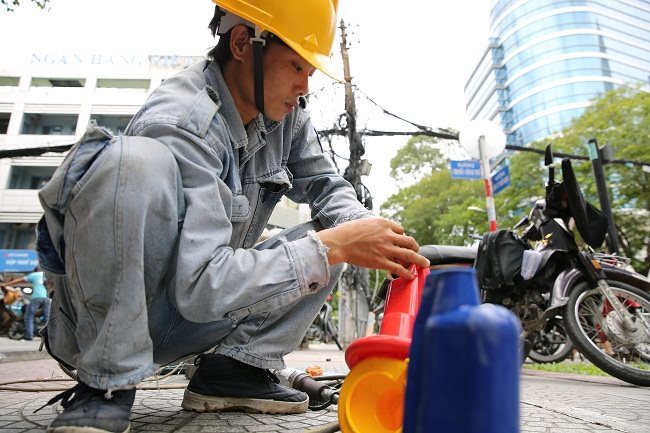 |
| A worker fixes a power line in HCMC. A new record for summertime power consumption was reached, peaking at more than 756.9 million kWh on May 18 |
Vu Xuan Khu, deputy director of the Electricity National Load Dispatch Center, said that the first five months of the year had not witnessed the peak of summer, but the electricity system has already seen a new record for power consumption.
In particular, the 24th marked the peak of extreme heat in April this year, and the maximum power point (Pmax) of the entire system that day rose by 16.2% from a year earlier to 35,703 megawatts (MW), surpassing the 2018 Pmax figure of 35,118 MW on July 3.
The figure peaked again, above 36,000 MW, on May 18 since there was a heat wave in the northern and central parts of the country, reaching temperatures of some 39-40 degrees Celsius. Also, nationwide power consumption reached a record high of 756.9 million kilowatt hours (kWh), compared with the highest level of 2018 at 725 million kWh on July 3.
Up to April this year, power consumption totaled more than 74.3 billion kWh, a year-on-year rise of 11%.
Even though summer has just started, the demand for electricity has grown dramatically while the operation of the power system has been under enormous pressure, according to the center.
With regard to hydropower, only lakes in the northern region have relatively large volumes of water, equivalent to their averages for many years. Meanwhile, most hydropower reservoirs in the central, Central Highlands and southern parts of the country have low levels of water.
Currently, the output of hydroelectricity among lakes in the central and southern regions is some 2 billion kWh, equal to the total load of the country for three working days.
The center claimed that in meeting the increasing power demand, it has made use of all oil-fired thermal power sources since April 2019.
Ngo Son Hai, deputy general director of State-owned utility Vietnam Electricity Group (EVN), said that the group has adopted short- and long-term solutions to ensure an adequate electricity supply.
The group is offering its support to nearly 100 solar power projects, which are expected to begin official operations by late June this year, he added.
According to EVN, its consumers have cranked up their air-conditioners to escape the prolonged heat wave, which could threaten the safety and stability of the electricity system and lead to grid overload.
Since more heat waves have been forecast, the group recommended organizations and the public use electricity in a safe, economical and efficient manner.
Air-conditioners should be set at some 26 degrees Celsius to save power, reducing the risk of a power overload and surging electricity bills, it suggested.
EVN said that the development of rooftop solar power is regarded as an effective solution for adding power sources for local use, reducing the pressure on investment in new power grids and cutting transmission risks.
The Government has introduced a pricing system to encourage this development, so EVN is committed to assisting businesses and the public by simplifying the relevant procedures, providing bidirectional meters and making timely electricity payments for households that install solar panels. SGT
Lan Nhi
 The consumption of electricity has set a new record, exceeding the peak of 2018 and thus putting the national power grid under pressure.
The consumption of electricity has set a new record, exceeding the peak of 2018 and thus putting the national power grid under pressure.